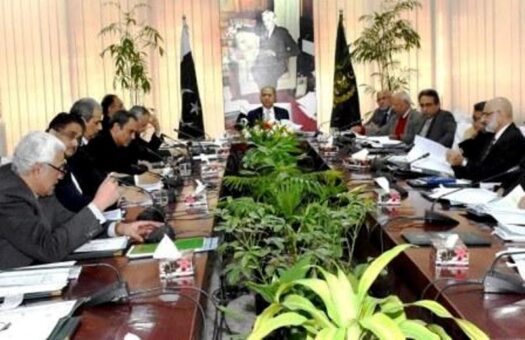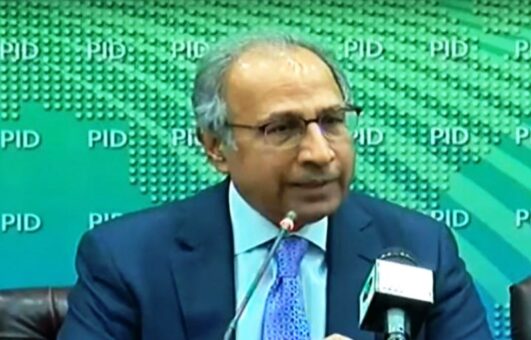ISLAMABAD: The Economic Coordination Committee (ECC) of the Cabinet non Wednesday approved free period from five working days to 15 working days for cargo and containers landing up to May 31, 2020.
The ECC considered and approved a proposal by the Ministry of Maritime Affairs for extension due to corona pandemic of free period from five working days to 15 working days for cargo and containers landing for period up to May 31, 2020.
The ECC of the Cabinet has asked the Ministry of National Food Security and Research to closely monitor the wheat procurement process and actively engage with the food departments and PASSCO to ensure procurement of wheat as per 8.25 million tones target set for procurement by the public sector this year.
The ECC meeting chaired by Adviser to the Prime Minister on Finance and Revenue Dr Abdul Hafeez Shaikh asked the Ministry of National Food Security and Research to submit to ECC a detailed report in the next two to three weeks on the progress of wheat procurement by PASSCO and provincial food departments and overall wheat production in the country with the help of reliable data and figures to have a clearer picture for better planning in future.
The ECC also called for exploring possibilities for extending more time to flour mills to procure wheat from the market, allowing inter-provincial movement and preventing smuggling of wheat outside Pakistan.
The ECC gave the instruction after a report was presented to it by the Ministry of National Food Security and Research on wheat procurement by the public sector in the current season.
The Ministry, in its report, told the ECC that the wheat procurement target for the wheat crop 2019-20 was set to 8.25 million tones with 4.5 million tones to be procured by Punjab, 1.4 million tones by Sindh, 0.4 million tones by Khyber Pakhtunkhwa, 0.1 million tones by Balochistan and 1.8 million tones by PASSCO.
So far PASSCO and the provincial food departments had procured 3.96 million tones of wheat, approximately 48 percent of the target while the procurement pace was slow in KP and Balochistan and both the provinces had been requested to speed up the procurement process.
The ECC also took up another proposal by the Ministry of National Food Security and Research for fixing an intervention price for cotton and after a detailed discussion asked the Ministry to come up with a comprehensive package focusing on cotton seed research, overall research and development, better water management, deregulation of the sector and zoning of crop growing areas to enhance productivity and competitiveness of the local crop.
The ECC also discussed and approved five separate supplementary grants on different proposals submitted by various divisions.
On two separate proposals for technical supplementary grants by the Defence Division, Rs 1.665 billion grant was approved for upgradation of Special Telecom Monitoring Project at Directorate ISI and a Rs 500 million for construction of Special Education School at the Defence Complex Islamabad.
On a proposal by the Prime Minister’s Inspection Commission, a technical supplementary grant of 10.476 million was approved for assistance package for the family of Raees Anwar Abbasi, Senior Private Secretary (BS-19), Prime Minister’s Inspection Commission following his death on 12th August 2019.
On a proposal for technical supplementary grant by the Poverty Alleviation & Social Safety Division, an amount of Rs12.143 million was approved following transfer of the subject of “Collection of Zakat and Ushr, disbursement of Zakat and Ushr to the Provinces and other areas as per formula approved by the Council of Common Interest” from Religious Affairs & Interfaith Harmony to the PA&SS Division and subsequent transfer of officers along with their posts and budgets by the Ministry of Religious Affairs & Interfaith Harmony to the PA&SS Division.
On another proposal for technical supplementary grant by the Finance Division, the ECC approved Rs 306.615 million for the Office of Controller General of Accounts during FY 2019-20 for payment of dues on account of Prime Minister’s Assistance Package. On a proposal by the Ministry of Interior, the ECC allowed Capital Development Authority (CDA) Islamabad to allocate Rs 3.05 billion to the Metropolitan Corporation Islamabad (MCI) on loan basis for payment of obligatory expenses for the second half of the FY 2019-20.
The ECC also considered and approved a proposal for reconstitution of a Committee formed by the ECC in its meeting on 26th March 2020 for examination of incentive package for the National Electronic Vehicle Policy by nominating the Minister for Industries and Production Hammad Azhar in place of Abdul Razak Dawood as Chairman and member of the committee following the cabinet reshuffle and including Secretary Commerce as member of the Committee in place of Adviser to the Prime Minister on Commerce and Investment Abdul Razak Dawood.
The ECC also approved another proposal by the Ministry of Maritime Affairs for technical supplementary grant of Rs 58 million as compensation of the demolished structures of Pakistan Coast Guards in order to provide 19 acres land previously in possession of Pakistan Coast Guards and vacated for Gwadar Free Zone and Right of Way of the Eastbay Expressway. On a proposal by the Ministry of Energy for development of a new mechanism/criterion for disbursement of payments to the tune of Rs 300 billion through CPPA-G to the power generators, the ECC asked the Power Division to devise the requisite criterion for fair and equitable disbursement of payments to the power generators and come back to ECC for its approval.
On another proposal by the Power Division, the ECC approved shifting of most expensive loan from the books of PHL to Government of Pakistan and taking up of Rs 136.454 billion loan in the FY 2019-20 while other loans to be considered in the following financial years accordingly.
On another proposal by the Power Division, the ECC gave go-ahead to issuance of new sovereign guarantee by the Ministry of Finance in respect of fresh syndicated term finance facility for Rs 41 billion through Power holding Limited (PHL) for the purpose of set off/adjustment of existing PHL finance facility of Rs 41 billion executed in pursuance of ECC decision made on 7th June 2017. The ECC, on a proposal by the Petroleum Division, asked the Finance Division to transfer Rs 11.7 billion in the NBP account for ensuring remittances to Kuwait as per schedule.







